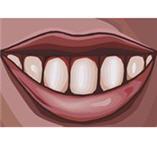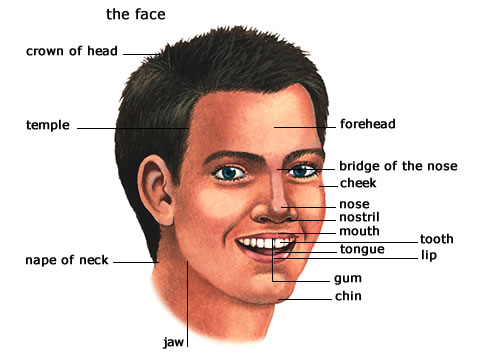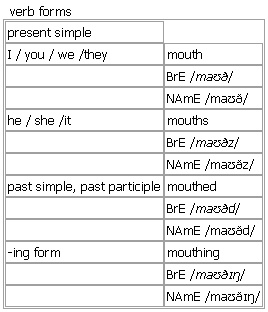 mouth
mouth

mouth [mouth mouths mouthed mouthing] noun, verb
noun BrE [maʊθ] ; NAmE [maʊθ] (pl. mouthsBrE [maʊðz] ; NAmE [maʊðz] )
PART OF FACE
1. the opening in the face used for speaking, eating, etc; the area inside the head behind this opening
• She opened her mouth to say something.
• His mouth twisted into a wry smile.
•Their mouths fell open (= they were surprised).
•Don't talk with your mouth full (= when eating).
•The creature was foaming at the mouth. 
see also ↑foot-and-mouth disease
PERSON NEEDING FOOD
2. a person considered only as sb who needs to be provided with food
•Now there would be another mouth to feed.
•The world will not be able to support all these extra hungry mouths.
ENTRANCE/OPENING
3. ~ (of sth) the entrance or opening of sth
•the mouth of a cave/pit
see also ↑goalmouth
OF RIVER
4. the place where a river joins the sea
• A number of industries sprang up around the mouth of the river.
WAY OF SPEAKING
5. a particular way of speaking
• He has a foul mouth on him!
•Watch your mouth! (= stop saying things that are rude and/or offensive)
see also ↑loudmouth
-MOUTHED
6. (in adjectives)having the type or shape of mouth mentioned
•a wide-mouthed old woman
•a narrow-mouthed cave
see also ↑open-mouthed
7. (in adjectives)having a particular way of speaking
•a rather crude-mouthed individual
see also ↑foul-mouthed, ↑mealy-mouthed
more at have a big mouthme and my big mouth at ↑big adj., born with a silver spoon in your mouth at ↑born, take the bread out of sb's mouth at ↑bread, butter wouldn't melt in sb's mouth at ↑butter n., foam at the mouth at ↑foam v., put your foot in your mouth at ↑foot n., look a gift-horse in the mouth at ↑gift, sb's heart is in their mouth at ↑heart, (straight) from the horse's mouth at ↑horse n., live (from) hand to mouth at ↑live 1, melt in your mouth at ↑melt, put your money where your mouth is at ↑money, shoot your mouth off at ↑shoot v., shut your mouth/face at ↑shut v., leave a bad/nasty taste in the mouth at ↑taste n., watch your mouth/tongue at ↑watch v., by word of mouthput words into sb's mouthtake the words right out of sb's mouth at ↑word n.
Word Origin:
Old English mūth, of Germanic origin; related to Dutch mond and German Mund, from an Indo-European root shared by Latin mentum ‘chin’.
Example Bank:
•A cool smile played across her mouth.
•A smile played around his strong mouth.
•A tight mouth was the only sign of her nerves.
•Don't talk with your mouth full!
•Good mouth care is very important when you are having chemotherapy.
•He began to stuff his mouth with pasta.
•He coughed as the blood filled his mouth.
•He covered his mouth to hide his yawn.
•He pulled the boy from the river and gave him mouth-to-mouth.
•He wiped his greasy mouth on his sleeve.
•Her mouth curved into a smile.
•Her mouth suddenly set in a determined line.
•His mouth compressed into a thin, hard line.
•His mouth lifted in a wry smile.
•His mouth widened to a smile.
•I could taste blood in my mouth.
•I was so thirsty my tongue was sticking to the roof of my mouth.
•My mouth started watering when I smelled the food.
•Our mouths dropped open in surprise.
•She has four hungry mouths to feed.
•She put her hand over her mouth to stifle the cough.
•Suddenly a hand cupped her mouth.
•The corners of her mouth turned up in a slight smile.
•The dog was foaming at the mouth and near death.
•The hot coffee burned her mouth.
•There was blood trickling from the corner of his mouth.
•There were lines of tension about his mouth.
•Twins would mean two extra mouths to feed.
•They drew nearer to the mouth of the cave.
•Up ahead was the tunnel mouth.
Idioms: ↑all mouth ▪ ↑down in the mouth ▪ ↑keep your mouth shut ▪ ↑out of the mouths of babes ▪ ↑run off at the mouth
Derived: ↑mouth off
verb BrE [maʊð] ; NAmE [maʊð]
1. ~ sth | + speech to move your lips as if you were saying sth, but without making a sound
•He mouthed a few obscenities at us and then moved off.
2. ~ sth | + speech (disapproving)to say sth that you do not really feel, believe or understand
•They're just mouthing empty slogans.
Verb forms: 
Word Origin:
Old English mūth, of Germanic origin; related to Dutch mond and German Mund, from an Indo-European root shared by Latin mentum ‘chin’.
|
|
